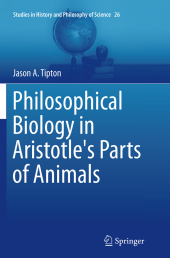 Neuerscheinungen 2016Stand: 2020-02-01 |
Schnellsuche
ISBN/Stichwort/Autor
|
Herderstraße 10
10625 Berlin
Tel.: 030 315 714 16
Fax 030 315 714 14
info@buchspektrum.de |

Jason A. Tipton
Philosophical Biology in Aristotle´s Parts of Animals
Softcover reprint of the original 1st ed. 2014. 2016. xi, 207 S. 26 SW-Abb., 40 Farbabb. 235 mm
Verlag/Jahr: SPRINGER, BERLIN; SPRINGER INTERNATIONAL PUBLISHING 2016
ISBN: 3-319-37652-7 (3319376527)
Neue ISBN: 978-3-319-37652-3 (9783319376523)
Preis und Lieferzeit: Bitte klicken
This book provides a detailed analysis of Aristotle´s Parts of Animals. It presents the wealth of information provided in the biological works of Aristotle and revisits the detailed natural history observations that inform, and in many ways penetrate, the philosophical argument. It raises the question of how easy it is to clearly distinguish between what some might describe as "merely" biological and the philosophical. It explores the notion and consequences of describing the activity in which Aristotle is engaged as philosophical biology. The book examines such questions as: do readers of Aristotle have in mind organisms like Ascidians or Holothurians when trying to understand Aristotle´s argument regarding plant-like animals? Do they need the phenomena in front of them to understand the terms of the philosophical argument in a richer way? The discussion of plant-like animals is important in Aristotle because of the question about the continuum between plant and animal life. Where does Aristotle draw the line? Plant-like animals bring this question into focus and demonstrate the indeterminacy of any potential solution to the division. This analysis of Parts of Animals shows that the study of the nature of the organic world was Aristotle´s way into such ontological problems as the relationship between matter and form, or form and function, or the heterogeneity of the many different kinds of being.
Dedication.- Acknowledgments.- Table of Contents.- Chapter 1: Aristotle´s Philosophy and Biology: The biological phenomena.- Chapter 2: The Problem of Beginnings.- Chapter 3: Recognizing Sameness and Otherness in Animals.- Chapter 4: The Examination of the Animate in Light of the Inanimate: or,The Argument for the Autonomy of the Zoological Inquiry.- Chapter 5: Finding Fault with Nature.- Chapter 6: The Division and Combination of Labor.- Bibiography - Editions, Translations and Commentaries.- Index.


